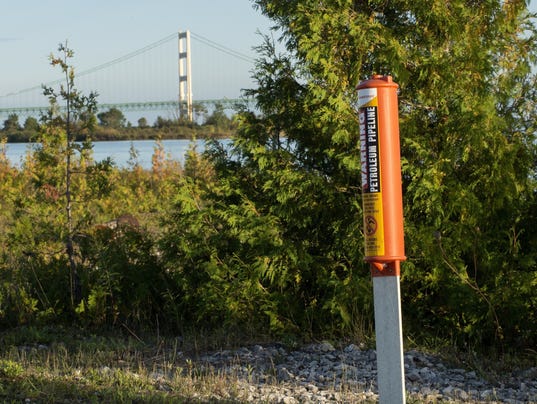Detroit Free Press
DNR chief: Michigan’s deal with Enbridge isn’t end of Line 5 discussion
Keith Creagh March 12, 2018
 (Photo: Neil Blake, AP)
(Photo: Neil Blake, AP)
Michiganders are passionate about the Great Lakes, understandably so. More than any other natural resource the lakes define who we are – geographically, culturally and historically. There is no more important task than properly protecting and managing the lakes for the benefit of future generations.
The shared passion for the Great Lakes has surfaced in public concern over Line 5, the 645-mile-long pipeline owned and operated by Enbridge Energy, Inc., that passes beneath the Straits of Mackinac. Along with the Michigan Attorney General, state agencies – the Michigan Agency for Energy and the Michigan departments of Natural Resources and Environmental Quality – have undertaken an analysis of Line 5 to determine its future. Hundreds of comments at public feedback sessions, and thousands of comments submitted electronically, will help the state formulate a final decision on the line.
 Keith Creagh , director of the Michigan Department of Natural Resources (Photo: David Kenyon)
Keith Creagh , director of the Michigan Department of Natural Resources (Photo: David Kenyon)
Even as that process unfolded, however, we recognized that we could not wait for that analysis to be complete before compelling Enbridge to provide additional protections for the Great Lakes. So on Nov. 27 of last year, Gov. Rick Snyder signed an agreement that provides those protections.
There has been some confusion about what the agreement does and does not do. Let me be clear: The agreement does not represent the state’s final decision regarding Line 5. The process of determining the best future for Line 5 continues with public meetings of the Pipeline Safety Advisory Board and with an in-process risk analysis led by Guy Meadows of Michigan Technological University.
Opinion: Enbridge Line 5 problems draw strong words from state officials. Again.
More: Enbridge oil pipelines in Straits, St. Clair River could go in tunnels under new pact
The state has already commissioned an alternatives analysis that reviews alternatives to Line 5 beneath the Straits. In other words, the agreement with Enbridge is not final, but it is an important interim step to protect our natural resource treasures, especially the Great Lakes.
Just as important as what the agreement does not do is what it does. The agreement:
Leaves all options on the table, including the possibility of closing down Line 5 in the Straits.
Provides a deadline — set by the governor as September of this year — for further consideration of what should happen to Line 5 beneath the Straits of Mackinac and requires Enbridge to complete a study of the feasibility of tunneling beneath the Straits of Mackinac and other options to the current line.
Provides for additional transparency and truthfulness, including state-hired contractors who are working alongside Enbridge employees to verify the company’s data and due diligence.
Replaces the portion of Line 5 that crosses beneath the St. Clair River, a site where this action can be quickly accomplished. The St. Clair River is a primary source of drinking water for southeast Michigan and an environmentally sensitive location along the pipeline.
Temporarily shuts down operation of Line 5 in the Straits during periods of sustained adverse weather conditions, because those conditions do not allow for an adequate response to potential oil spills. This provision was already put to use in December.
Requires Enbridge, in partnership with the state, to evaluate other Line 5 water crossings in Michigan to identify additional measures to minimize the likelihood and consequences of an oil spill at these locations, and implement measures where appropriate. This provision extends the rightful concern and focus on the Straits to other water crossings along the entire length of Line 5 in Michigan.
To date there is no indication that Line 5 presents an immediate safety hazard. Nevertheless, all pipelines have a life-span. Our task as a state is to determine what the lifespan of Line 5 ought to be, and what, if anything, should replace Line 5 when that lifespan is complete. The state has a process for making that decision. There is no reason to wait for that process to play out to provide needed safeguards for the Great Lakes. Our children and grandchildren deserve no less.
Keith Creagh is director of the Department of Natural Resources and co-chair of the Michigan Pipeline Safety Advisory Board.
